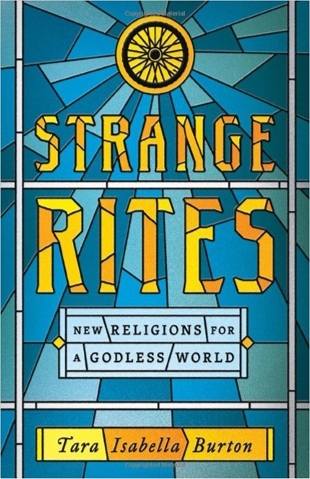"By and large, today's new cults of and for the Remixed are what I will call 'intuitional religions.' By this, I mean that their sense of meaning is based in narratives that simultaneously reject clear-cut creedal metaphysical doctrines and institutional hierarchies and place the locus of authority on people's experiential emotions, what you might call gut instinct. Society, institutions, credited authorities, experts, expectations, rules of conduct — all these are generally treated not just as irrelevant, but as sources of active evil. Wellness culture, modern occultism, social justice activism, techno-utopianism, and the modern sexual revolution all share a fundamental distrust, if not outright contempt, for institutions and scripts. Most of these new religions share, too, the grand narrative that oppressive societies and unfairly narrow expectations stymie natural — and sometimes even divine — human potential.
"Today's Remixed religions valorize different forms of emotional experience — a person's perceived energy as a clue to their bad character, a modern witch's sense of divine presence during a spell-casting session, a feminist's lived experience as an authoritative account of the world — as the key to interpreting both meaning and purpose. They value, too, authenticity: the idea that one's actions are in harmony with one's emotions. They're less keen on rules, or doctrines, or moral codes that they dismiss as restrictive or outmoded. They're suspicious of moral or truth-claims that don't root themselves in subjective experience. Three-quarters of millennials (and 67 percent of the religious Nones overall) now say they agree with the statement 'Whatever is right for your life or works best for you is the only truth you can know,' compared with just 39 percent of the elderly, and 47 percent of practicing Christians of all ages. The Remixed demand agency and creative ownership in their spiritual lives, dissatisfied with the narrowness of the options available. Among the most common sayings I heard among the people I interviewed was, 'I made my own religion.'
"And the Remixed are willing to put their consumer collars into pursuing these new religions. If 'sex sells' was the unofficial advertising mantra of the Mad Men era, then 'spirituality sells' is the slogan for post-2016. One 'experience management software,' for example, promises without a shred of irony that it will 'help turn customers into fans/products into obsessions/employees into ambassadors/brands into icons.'
"The most successful new religions of 2020 and beyond are the ones that have taken this intuitional turn and found ways to make it both communal and — in an increasingly brand-driven age -- salable. They're the ones that take the extant consumer-capitalist culture of our age — smartphones, social media, Moon Juice, 4chan boards, oat milk — and make interacting with it into a sacred ritual, an avenue to fulfilling a wider purpose in a meaningful world. They're the ones that alchemize our everyday activities — eating, working out, following the news, posting on social media — and turn them, as Punchdrunk did to the McKittrick Hotel, into strange and sacred rites, not hobbies but rituals. They're the ones that have figured out how to take Twitter, or Instagram, or consumer culture, and enchant it.
"For some, this freedom is revelatory, even necessary. For many women who see in organized religion the relics of an oppressive patriarchal culture, or for the nearly 50 percent of queer people — so often marginalized by traditional faiths — who now call themselves religiously unaffiliates, these new religions offer an opportunity to seek out spiritual trust and a connection with the divine, beyond doctrine (and often communities) that would treat them as pariahs.
"But, at the same time, the refractory nature of these new intuitional religions — each one, at its core, a religion of the self — risks creating an increasingly balkanized American culture: one in which our desire for personal authenticity and experiential fulfillment takes precedent over our willingness to build coherent ideological systems and functional, sustainable institutions.
"When we are all our own high priests, who is willing to kneel?"
